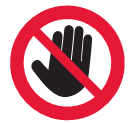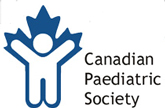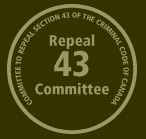The Repeal 43 committee ( see www.Repeal43.org ) published the 1/2 page ad below in Canada's largest national newspaper, The Globe and Mail, on November 20th, 2008. The Repeal43 Committee has placed similar ads in previous years.

Open Letter to Members of Parliament
Physical punishment causes harm.
Let's respect a child's right to be protected.
Dear Members of Parliament:
November 20 is National Child Day - a day to celebrate the United
Nations Convention on the Rights
of the Child, ratified by Canada in 1991.
Unfortunately, Canada is in violation of this Convention because it
has not repealed Section 43 of the
Criminal Code - a 19th century provision allowing parents to hit children
for the purpose of "correction".
The UN Committee monitoring the Convention has repeatedly asked our government to repeal this section. It violates a child's right to protection from assault and creates a risk of serious physical and mental harm. In 2009, Canada will again report to the UN on the implementation of the Convention and the progress made on ensuring children's rights.
We, the undersigned, call on you to repeal Section 43 - thus meeting our obligation to both the UN Convention on the Rights of the Child, and our responsibility to protect and prevent harm to children.
Organizations from across Canada that were listed in the ad and who support abolishing Section 43 of the Criminal Code of Canada which allows assaulting/hitting children.
Abbotsford Community Services
Aisling Discoveries Child and Family Centre
Alliance for Children and Youth of Waterloo Region
Amnesty International Canada
Amnistie internationale, section canadienne francophone
Andrew Fleck Child Care Services
Association des centres jeunesse du Québec
Association des Médecins en Protection de l'Enfance du Québec
Association of Early Childhood Educators Ontario
Atlantic Therapy and Assessment Centre
Attachment Parenting Canada
Bayfield Treatment Centres
BC Council for Families
BCGEU Community Social Services Component
Blue Hills Child and Family Centre
Boost Child Abuse Prevention & Intervention
Boys and Girls Clubs of Canada
Burnaby Family Life
CAMH Centre for Prevention Science
Canadian Academy of Child and Adolescent Psychiatry
Canadian Association for Community Living
Canadian Association of Family Resource Programs
Canadian Association of Occupational Therapists
Canadian Association of Social Workers
Canadian Child Care Federation
Canadian Children's Rights Council - Conseil canadien des droits des enfants
Canadian Coalition for the Rights of Children
Canadian Council for Reform Judaism
Canadian Federation of University Women
Canadian Foster Family Association
Canadian Foundation for Children, Youth and the Law
(Justice for Children and Youth)
Canadian Institute of Child Health
Canadian Physiotherapy Association
Canadian Psychological Association
Canadian Public Health Association
Canadian Society for the Prevention of Cruelty to Children
Catholic Children's Aid Society of Toronto
Catholic Family Services of Saskatoon
Catholic Social Services of Edmonton
Centre des services communautaires Vanier
Centre for Research and Education on Violence Against Women
and Children, Faculty of Education, University of Western
Ontario
CHEO: Children's Hospital of Eastern Ontario
Child Abuse Prevention Council of London and Middlesex
Child and Youth Advocate, Province of Newfoundland and Labrador
Child & Youth Friendly Ottawa
Child Care Resource & Referral Program BC
Child Development Institute
Child Protection Centre, Children's Hospital of Winnipeg
Child Welfare League of Canada
Children's Aid Foundation
Children's Aid Society of Grey County
Children's Aid Society of London and Middlesex
Children's Aid Society of Toronto
Children's Mental Health Ontario
Children's Rights Centre, Cape Breton University
Clinique de pédiatrie sociojuridique du Centre Hospitalier
Universitaire Ste-Justine
College-Montrose Children's Place
Collingwood Neighbourhood House, Vancouver
Comité hospitalier de protection de l'enfance CHUL, Québec
Commission des droits de la personne et des droits de la
jeunesse du Québec
Community Living Toronto
Community Safety & Crime Prevention Council of Waterloo Region
Defence for Children International - Canada
Direction de la santé publique, Agence de la santé et des services sociaux de Montréal
Eastern School District, PEI
Educating for Peace
Faculty of Social Work, University of Regina
Family and Children's Services of Guelph and Wellington County
Family Education Centre, Brampton, ON
Family Service Saskatoon
Family Service Thames Valley
Family Service Toronto
Family Services of Greater Vancouver
Family Services of the North Shore
Federation of Child & Family Services of BC
First Call: BC Child & Youth Advocacy Coalition
First Nations Child & Family Caring Society of Canada
Gloucester Association for Children with Special Needs
Health Nexus/Best Start Resource Centre
Healthy Child Coalition - Central Region, Manitou, Manitoba
Infant Mental Health Promotion, Hospital for Sick Children
IWK Health Centre, Department of Pediatrics
Jewish Child and Family Service, Winnipeg
Jewish Family and Child Service of Greater Toronto
Jewish Family Services, Edmonton
John Howard Society of Sudbury
Kids Help Phone
Kinark Child and Family Services
Kingston Interval House
Kootenay Region Branch of the United Nations Association
in Canada
Macaulay Child Development Centre
Manitoba Child Care Association
Many Rivers Counselling and Support Services Society, Whitehors
McMaster Children's Hospital, Child Advocacy and
Assessment Program
National Council of Women of Canada
National Youth In Care Network
New Brunswick Association of Social Workers
New Brunswick Association of Speech-Language
Pathologists and Audiologists
Newfoundland & Labrador Foster Families Association
Northeastern Catholic District School Board, Timmins, ON
Northern Child and Family SCAN Clinic
Office of the Child and Youth Advocate, Alberta
Office of the Provincial Advocate for Children and Youth, Ontari
Ombudsman/Child and Youth Advocate, New Brunswick
Ontario Association of Child and Youth Counsellors
Ontario Association of Children's Aid Societies
Ontario Association of Social Workers
Ontario Public Health Association
Open Doors for Lanark Children and Youth
Ottawa Community Committee on Child Abuse
Parenting Education Saskatchewan
Parenting Today
Peel Children's Aid Society
Perth District Health Unit, Stratford, ON
Professional Parenting Canada
Provincial Advisory Committee on Child Abuse, Manitoba
Provincial Council of Women of Ontario
Repeal 43 Committee
Representative of Children and Youth, Province of BC
ROCK Reach Out Centre for Kids
Saskatchewan Association of Social Workers
Saskatchewan Children's Advocate Office
Save the Children Canada
SMARTRISK
Society for Children and Youth of B.C.
South-East Ottawa Community Health Centre
Sparrow Lake Alliance
St. Mary's Home/MaisonSainte-Marie
Thames Valley Children's Centre
The United Church of Canada
Toronto Public Health
UNICEF Canada
V.O.I.C.E. (Violence Overcome In Creative Ensemble)
Western Ottawa Community Resource Centre
Windsor-Essex Children's Aid Society
YMCA of Greater Toronto
Yorktown Family Services

Don't Spank - Canadian Paediatric Society
Effective discipline for children
Reaffirmed: February 1, 2014
Principal author(s)
P Nieman, S Shea; Canadian Paediatric Society, Community Paediatrics Committee
Paediatric Child Health 2004;9(1):37-41
The word discipline means to impart knowledge and skill - to teach. However, it is often equated with punishment and control. There is a great deal of controversy about the appropriate ways to discipline children, and parents are often confused about effective ways to set limits and instill self-control in their child.
In medical and secular literature, there is great diversity of opinion about the short-term and long-term effects of various disciplinary methods, especially the use of disciplinary spanking. This statement reviews the issues concerning childhood discipline and offers practical guidelines for physicians to use in counselling parents about effective discipline.
The Canadian Paediatric Society recommends that physicians take an anticipatory approach to discipline, including asking questions about techniques used in the home. Physicians should actively counsel parents about discipline and should strongly discourage the use of spanking.
![]()
Spanking May Lead to Aggression Later in Life
ABC TV, USA
07 February, 2012
Physical punishment of children, such as spanking, is increasingly linked with long-term adverse consequences, researchers wrote.
An analysis of research conducted since the 1990 adoption of the UN's Convention on the Rights of the Child suggests that no studies have found positive consequences of physical punishment, according to Joan Durrant of the University of Manitoba in Winnipeg, and Ron Ensom of the Children's Hospital of Eastern Ontario in Ottawa.
While some studies have found little effect either way, most research has uncovered a range of negative outcomes, including increased aggression and later delinquency, Durrant and Ensom wrote online in CMAJ.
The clinical implication, they suggested, is that doctors who are familiar with the research can help parents find more constructive ways of providing discipline.
"In doing so, physicians strengthen child well-being and parent-child relationships at the population level," they wrote.
They noted that as recently as 1992, physical punishment of children was widely accepted, thought of as distinct from abuse, and considered "appropriate" as a way of eliciting desired behavior.
But research under way at that time was beginning to draw links between physical punishment and aggression in childhood, later delinquency, and spousal assault.

The Supreme Court of Canada -
Cour suprême du Canada
Corporal Punishment of Children Decision

Alyson Schafer on Spanking and Corporal Punishment of Children
Alyson Schafer is a psychotherapist and one of Canada's leading parenting experts. She's the author of the best-selling "Breaking the Good Mom Myth" (Wiley, 2006) and host of TV's The Parenting Show a live call-in show in Toronto, Ontario.
The media relies on Alyson's comments and opinions. you can find her interviewed and quoted extensively in such publications as Cosmopolitan, Readers' Digest, Canadian Living, Today's Parents, and Canadian Families.
You can read Alyson's thoughts.

Parenting style can change child behaviour
CTV.ca News Staff, February 21, 2005
Parents who are punitive tend to have aggressive children. But a new survey suggests that when parenting practices change, a child's behaviour also changes.
The results of the National Longitudinal Survey of Children and Youth (NLSCY) suggests children show higher levels of aggression, are more anxious and less altruistic when parents have a more punitive parenting style.
Other countries don't allow assaults on children
Like Britain, countries such as Sweden, Finland, Norway, and Austria had a defence to assaults on children similar to our s. 43. These defences were removed between 1957 and 1977. The criminal law of these countries therefore gives children the same protection from assault as it gives adults. Beginning with Sweden in 1979, these countries also amended their civil child welfare laws to expressly prohibit corporal punishment so that the public fully understood it was illegal.

Public Health
October-December 2006
Spanking: It hurts more than you think
Spanking hurts more than you think is an early child development public education campaign that includes TV ads to remind parents that spanking is hitting and never a positive way to discipline your child.
Parenting is very rewarding, but nobody ever said it was easy. There are ups and downs, and both you and your child will make mistakes along the way. That's okay. You're not alone.
One of the major challenges you might face is discipline. When your child's behaviour pushes you to the edge, how do you handle it? Do you see spanking as a solution?
Read about: The problem with spanking
Reasons not to spank
Why discipline works. Use discipline to encourage good behaviour
Use discipline when your child misbehaves
Remember
Making it work Brochure, Posters "Take 1" Information Sheet Media Links for
more parenting information
website link
click here

Committee to Repeal Section 43 of the Criminal Code of Canada Which Allows Hitting Children to "Correct" Them
The Repeal 43 Committee is a national, voluntary committee of lawyers, paediatricians, social workers and educators formed in 1994 to advocate repeal of section 43 of the Criminal Code of Canada.
It is an offence under our Criminal Code to use force against anyone without their consent. This right to personal security is the most fundamental of all human rights. It is a protection against assault that all adults take for granted.
Children do not have the full benefit of this protection because section 43 of the Criminal Code justifies hitting children for disciplinary or "correction" reasons. This violates a child's right to the equal protection and benefit of the law guaranteed by our Canadian Charter of Rights and Freedoms.
It contravenes the United Nations Convention on the Rights of the Child. It violates a child's dignity and shows a lack of respect. It can lead to serious physical and emotional harm.
Over 400 organizations from across Canada that deal with children are against corporal punishment www.Repeal43.org


